Aberdeen’s commitment to inclusive and collaborative planning was on full display at the Aberdeen 2036: Towards a Fairer Future Conference, held at the city’s Beach Ballroom.
Hosted by Community Planning Aberdeen and the city’s Health Determinants Research Collaboration, the event brought together representatives from the private, public, and third sectors, alongside community members and children and young people, to shape the development of Aberdeen’s Local Outcome Improvement Plan (LOIP) 2026-2036.
Councillor Christian Allard, Co-Leader of Aberdeen City Council and Chair of the Board for Community Planning Aberdeen, said: “It was a pleasure to welcome so many to our Towards a Fairer Aberdeen 2036 conference – an important step in shaping our next Local Outcome Improvement Plan – our collective city plan for improvement. The challenges we face, from poverty and housing to health inequalities and the climate crisis, demand bold thinking and collective action.
“Our ambition is to create the conditions for everyone in Aberdeen to thrive. The Local Outcome Improvement Plan is a living commitment to improvement, shaped by our city’s voices and experiences. Together, we can build a future where opportunity is designed and not left to chance.”
The conference, held on August 27, contributed to an ongoing conversation about the city’s achievements, challenges, and future opportunities. Drawing on data from Aberdeen’s Population Needs Assessment, alongside insights gained through the “Your Place, Your Plans, Your Future” community engagement, the speakers in the morning session presented the emerging priorities and collective efforts aimed to identify innovative solutions to ensure the city reduces inequalities and leaves no one behind.
The conference theme, Towards a Fairer Future Aberdeen, underlined the city’s ambition to build a fairer, more inclusive future through meaningful engagement, co-design and shared leadership.
The morning session featured presentations from Community Planning Aberdeen’s Outcome Improvement Group Chairs, who shared emerging priorities and innovative solutions to the current systems that they have identified as being transformative and likely to reduce inequalities by taking a preventative approach and reshaping the very conditions that generate disadvantage.

Aberdeen City Council Co-Leader Councillor Allard (foreground) with representatives of Community Planning Aberdeen (back, left to right: Jillian Evans, Head of Health Intelligence and Divisional General Manger, Public Health, NHS Grampian; Graeme Simpson, Chief Officer, Children’s Social Work and Family Support at Aberdeen City Council; front, left to right: Michelle Crombie, Strategic Lead, Prevention and Community Empowerment at Aberdeen City Council; Alison Macleod, Strategy and Transformation Lead, Aberdeen City Health and Social Care Partnership; Duncan Abernethy, Director of Business Development at North East Scotland College.
Attendees were introduced to an expert panel comprising of:
- Ruth Glassborow, Director of Population Health and Wellbeing, Public Health Scotland.
- Campbell Thomson, QPM (Queen’s Police Medal), Independent Chair, Adult and Child Protection Committee.
- Heather Williams, Training and Participation Lead, Scottish Women’s Budget Group.
- Richard McCallum, Director of Public Spending, Scottish Government.
- Laura Young, Climate Activist, Environmental Scientist and Ethical Influencer.
- Alex Cumming, Executive Director of Delivery and Service Department, Scottish Action for Mental Health.
Ruth Glassborow, Director of Population Health and Wellbeing, Public Health Scotland, said: “This conference was a vital part of the process that Aberdeen will use to look at what action, what additional actions it’s going to take to tackle inequalities.
“We know that on average individuals in our most disadvantaged communities across Scotland live 10 years less than those in the most advantaged. We need to do some things differently to close that gap. And, it’s important in choosing what we do differently at a local level that a wide variety of stakeholders are involved in that decision making process and this conference was part of that for Aberdeen.”
Key speakers were:
- Michelle Crombie, Strategic Lead, Prevention and Community Empowerment, Aberdeen City Council.
- Jillian Evans, Head of Health Intelligence and Divisional General Manager, Public Health, NHS Grampian.
- Graeme Simpson, Chief Officer, Children’s Social Work and Family Support, Aberdeen City Council.
- Alison MacLeod, Strategy and Transformation Lead, Aberdeen City Health and Social Care Partnership.
- Duncan Abernethy, Director of Business Development, North East Scotland College.
Duncan Abernethy, Director of Business Development, North East Scotland College, said: “The voice of the community was essential for the conference’s success. The population needs analysis and it’s only by answering the voice of the community that we can truly make the interventions that will lead to the systematic improvements that we seek for Aberdeen and the communities that it serves.
“The breadth of the groups that were at the conference and the various sectors that they cover, the populations that they represent are all really important in order that we get a diverse view of the interventions that are proposed.”
Their presentations focused on five key themes:
- Children, Families and Lifelong Learning
- Economic Stability
- Communities and Housing
- Neighbourhood and Environment
- Health and Social Care
The afternoon session featured workshops focused on open discussions, with attendees sharing their perspectives on the emerging changes presented, as well as their ideas for change. The day concluded with reflections from Ruth Glassborow, Director of Population Health and Wellbeing, Public Health Scotland, who shared insights on the emerging changes.
To learn more about the development of the Local Outcome Improvement Plan 2026-2036: Local Outcome Improvement Plan and Locality Plans 2026–2036 Development - Community Planning Aberdeen